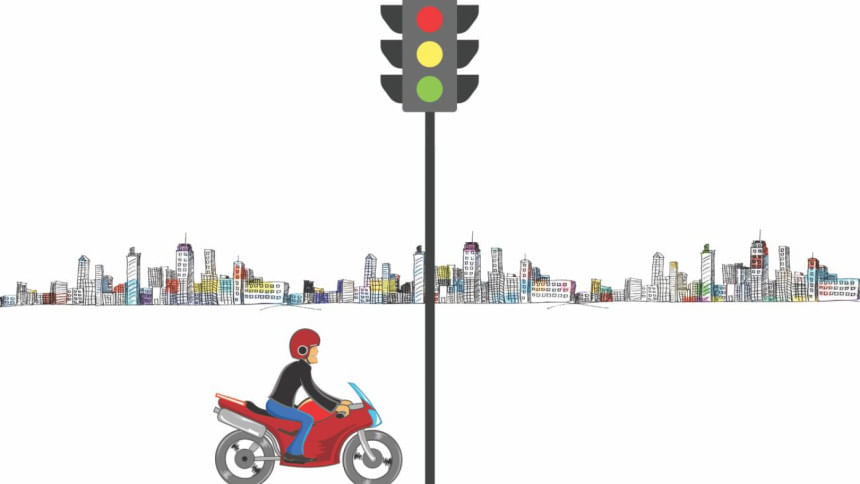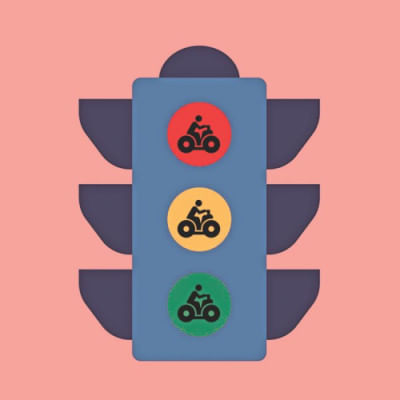Welcome, with caution

Md Nasir Uddin, an employee of a private company, has been using shared motorbike rides through ride sharing apps regularly since September 2017. His rating with Uber and Pathao, two popular ride-sharing apps operating in Bangladesh, is 4.9 out of 5 and 93 percent respectively. He uses these apps every day to move through Dhaka's nightmarish traffic on a shared motorbike. “My office is located at Karwan Bazaar and I live in Mohammadpur. When these motorbike-sharing apps were launched, it was a relief because there is no direct public transport from Mohammadpur to Karwan Bazar. I am now totally dependent on motorbikes for my transport in Dhaka city.”
Another factor that pulled Nasir towards app-based motorbike rides is its cost-efficiency. Thanks to his reputation as a regular client, Nasir enjoys a good amount of discount from the ride-sharing companies. “I usually get 30 percent to 55 percent discount on motorbike rides limiting my transport expenditure from home to office and back within Tk 70 to 100. When I used to hire CNG-run three-wheelers, it used to cost at least Tk 150 just from home to office.”
However, for the last couple of months Nasir has been experiencing a problem that reveals a stark limitation of these tech companies. According to Nasir, during rush hours, motorbike drivers, nowadays, don't want to travel relatively short distances unless it matches with their preferred destination. The rate of rejection from drivers has increased so much that Nasir sometimes has to resort to CNG-run three-wheelers to reach office on time. To his surprise, when Nasir goes to hire CNGs, he finds dozens of motorbike drivers waiting near the Mohammadpur bus terminal calling for passengers just like CNG drivers—they just don't want to be hired through apps.
“One day, when I was looking for CNGs, a biker came to me and said, I know you want to go to Karwan Bazaar. I had taken you there before. If you want to hire me for Tk 100, I can take you there within 20 minutes.” Seeing no better alternative, Nasir had to agree to that proposal but now passengers like Nasir think that this growing trend among bikers can be the prelude to the end of the dependability that app-based motorbike rides gave to clients like him. In fact, companies like Pathao and Uber are still helpless to prevent this practice as they cannot act without being notified by the customer. And, if the driver doesn't start the trip using the app, the customer cannot file a complaint or notify the company about the driver.
Motorbike drivers themselves admit to opting for personal contracts with the passengers instead of being hired through the app. Mohammad Kamrul Islam, a motor-biker who has given more than 300 rides with Uber and Pathao says, “The companies are giving discounts extensively, mostly for motorbike users. The discounted fare is then adjusted to our account several days later. This is why I often take passengers without the apps.”
Spokespersons of the ride sharing companies opine that the practice of taking a ride evading the app entails serious security concerns. According to ride sharing platforms such as Uber and Pathao, a passenger can see a driver's details in advance including his name, photograph, vehicle and the vehicle registration number. During a ride, Uber also offers the benefit of GPS tracking and using the “Share My Status” option, which enables the passenger to share their trip details with as many contacts on their phonebook as they want. Both these apps also have options for the passengers to submit feedback on a specific ride.
On the other hand, when a passenger hires a driver without these apps, s/he and the driver cannot be monitored at all and the passenger's safety lies solely in the hands of the driver. The driver and his/her vehicle become extremely vulnerable as well if the passenger has any subversive intention.
Although the app-based ride-sharing platforms are repeatedly expressing their commitment to safety and security of their driver partners and passengers, there are allegations that their online supervision is still not smart enough to ensure adequate safety of their driver partners and clients. Syed Athar, a lecturer of a private university, hired a Pathao ride to go home from his university at Bashundhara residential area. Coincidentally, the driver was a former student of the same university who was allegedly expelled from the institution. The driver, knowing that his passenger was a teacher of that university, started to use abusive remarks against Syed. At one stage, when Syed protested, the driver parked the motorcycle and made a phone call. Two more men appeared out of nowhere and assaulted Syed. Having done the deed, the biker and his cronies ran away with the bike, leaving Syed with minor injuries.
“I tried to reach out to Pathao on several platforms—the app itself did not have a number to a helpline. I messaged Pathao's Facebook page—there was no response. In the mean time I called my fiancée to let her know what was going on and she called the cops. Unfortunately, the cops were not being able to find me—Pathao though, had my location and was in a position to help the police, but they didn't have any system in place to do so.”
By the time Pathao's customer care had reached back to him, the rider and his goons were long gone. According to Syed, Pathao has allegedly banned the rider in question from their platform - but refused to launch any legal action because the biker wasn't an “employee” of Pathao.
Besides, allegations of sexual harassment, demanding tips and extra fare, ill-treatment with the passengers in shared rides are also not uncommon. In its home country, USA, Uber was fined a total of USD 8.9 million for allowing 57 drivers with criminal records to drive for the company.

On the other hand, physical safety of the driver partners and passengers from accidents, has also come up as a major concern. Motorbike drivers are seen violating the traffic rules extensively which significantly increase the risk of accidents. Mir Rezaul Alam, additional commissioner (traffic) of Dhaka Metropolitan Police comments, “Every vehicle is required to stop before the zebra crossing at intersections but motorcyclists often ignore this rule and cross the intersection. They violate laws and drive on the footpaths. It's really difficult to control them.” According to the traffic division of Dhaka Metropolitan Police, motorbikes were the most-fined category of vehicles during the 10-day long traffic week that started from August 5, 2018. In total they gave tickets to 83,000 vehicles, and motorbikes alone saw 44,000 cases against them.
Ride sharing companies have still not been able to formulate any effective system which can ensure that drivers are abiding by the traffic rules. According to Uber spokesperson, “Ride sharing industry is still at a nascent stage in Dhaka and several other parts of the world. As the demand for ridesharing grows, we are seeing hundreds of driver partners join the platform every day. Having said that, as with anything new, there is definitely a lot of room for improvement.”
“We currently have a robust training and onboarding process that focuses on how to use the app, navigation, road safety rules, customer service standards, etc. Some of this for first time smartphone users who take time to adjust and get accustomed with but we have seen that with time, driver partners get much better,” he adds.
Ahmed Fahad, Vice President, Pathao says, “Till date, around 10,000 free helmets have been given away. Recently it has been made mandatory for Pathao riders to have an extra helmet with them, or else they are given a negative 'safety review' by the users. We also organised a seminar conducted by DMP (Traffic North) where our riders directly got educated about safety issue and various important traffic rules.”
Except formulating the Ridesharing Service Guideline 2017, the Bangladesh government has not taken any step to ensure proper functioning of the ridesharing apps. This guideline was promulgated on February 28, 2018 to regulate the rapidly expanding ride sharing companies as The Motor Vehicle Ordinance 1983 prohibited commercial usage of any privately-owned vehicle. However, several provisions of the guidelines are so impractical that its proper implementation is almost impossible at present and due to this fact, the law enforcement agencies can do little to prevent malpractices perpetrated by the drivers and clients of the ridesharing companies.
For instance, the guideline makes it mandatory to have a ridesharing vehicle enlistment certificate for each vehicle registered with a ridesharing company. However, there is no explanation about what will be the qualifying criteria for this registration process. According to the guideline, an owner of the vehicle will be allowed to register his/her vehicle with a ride-sharing company after one year of the date of registration. The guideline further states that an owner of several vehicles can be allowed to register only one of his vehicles with a ride-sharing company. Again, the guideline compels the companies to collect detailed information about only the driver but there is no mention about the passenger which can make the vehicle and driver vulnerable to subversive activities perpetrated by unruly passengers.
Khademul Islam, traffic inspector of Dhaka's Tejgaon area says, “At present it is not possible for us to detect how many vehicles an owner has registered with the ride-sharing app. It is also impossible to find out when a vehicle was registered with a ride-sharing company and when it was given registration by the BRTA. While on duty in the streets, we can only examine the registration papers, license, tax token and insurance. We enforce the existing traffic laws and penalise the violators according to the law.”
Due to ambiguous provisions and absence of any concrete plan to implement the provisions, vehicles enlisted with ride sharing companies, particularly motorbikes, are still transporting large number of passengers without any accountability to the government.
Nevertheless, benefits of app-based ride-sharing services to the national economy cannot be denied. According to a 2018 report authored by Syed Mafiz Kamal and Noor A Ahsan, published by Policy Research Institute, the size of the ride sharing market in Dhaka is 2,200 crore a year and the market is expanding. The report further reveals that while an average car owner in Dhaka spends up to Tk 900 per trip, a ride-sharing car user spends some Tk 300 per trip and a ride-sharing motorbike user spends around Tk 150 per trip. According to a World Bank Report, average speed in Dhaka is somewhere between 7 and 8 km/hour. An average car moves at some 12 km/hour. In comparison, a bike from a bike-share service moves at some 16 km/ hour.
App based motorbike sharing services are simultaneously cost-effective and time-efficient. For millions of Bangladeshi urban middle-income people, who spend much of their time and wealth in traffic congestions, there is no doubt that these services will be one of their key media of transportation in the near future. Its rapid expansion and escalating importance in Bangladesh's urban life deserves that this new, tech-based transport sector should be regulated with more pragmatic policy which will be practicable for the entrepreneurs and safe and useful for the people.
The writer can be contacted at [email protected]

 For all latest news, follow The Daily Star's Google News channel.
For all latest news, follow The Daily Star's Google News channel. 



Comments